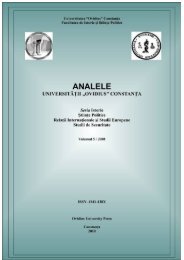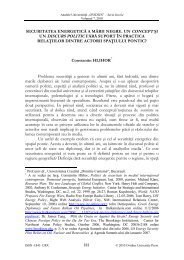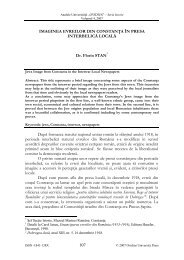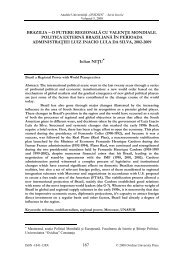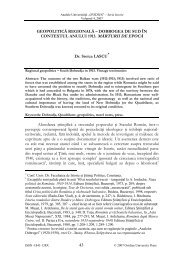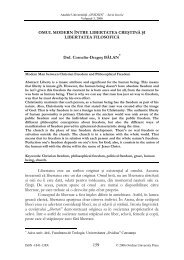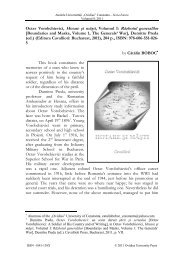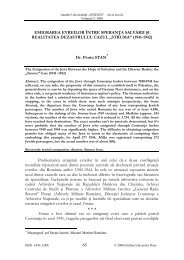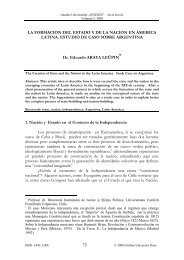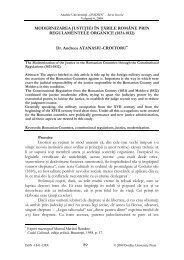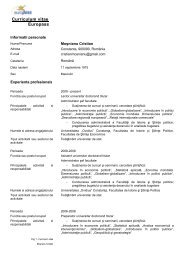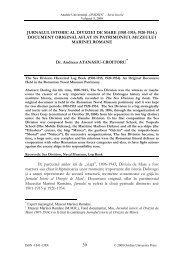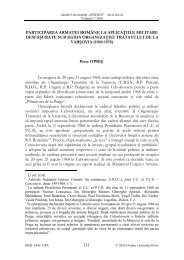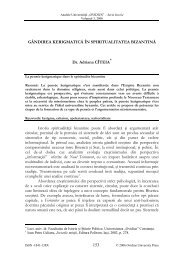analele universitÄÅ£ii âovidiusâ constanÅ£a - AUOCSI
analele universitÄÅ£ii âovidiusâ constanÅ£a - AUOCSI
analele universitÄÅ£ii âovidiusâ constanÅ£a - AUOCSI
You also want an ePaper? Increase the reach of your titles
YUMPU automatically turns print PDFs into web optimized ePapers that Google loves.
Alexey A. Gromyko / Analele Universităţii „OVIDIUS” / Vol. 6/ 2009<br />
During his first visit to Germany, soon after presidential election,<br />
Dmitry Medvedev delivered a programmatic address in Berlin, where he said: “I<br />
am certain that we cannot resolve Europe’s problems until we achieve a sense of<br />
identity and an organic unity between all of its integral components, including<br />
the Russian Federation… The end of the Cold War made it possible to build up<br />
genuinely equal cooperation between Russia, the European Union and North<br />
America as three branches of European civilization.” 10 He is echoed by the<br />
Foreign Policy Concept of the Russian Federation, approved in July 2008:<br />
“Being the biggest European State… Russia stands ready to play a constructive<br />
role in ensuring a civilizational compatibility of Europe…” 11 Following the<br />
president, Russian foreign minister Sergey Lavrov contemplated on the same<br />
idea: “The space from Portugal to the Russia’s Far East has become a “field” of<br />
entire European civilization.” 12 This was close but, of course, different from<br />
what Vladislav Surkov proclaimed in 2006: “the Russian civilization is part of<br />
the European civilization.” 13<br />
In January 2009, Vladimir Putin visited Germany for the first time as<br />
prime minister. Several months before, there were the events in Transcaucasus,<br />
followed by the vociferous propagandist campaign aimed at Russia. Proponents<br />
of the new Cold War raised their heads. Notably, the topic of the European<br />
unity, however, did not disappear from the view of the Russian leadership.<br />
“Russians and Germans live in one house, have common values, and bear the<br />
common cultural traditions from their birth,” prime minister said during his<br />
speech in Dresden. “Russia and Europe have always been a part of the common<br />
civilizational space.” 14 Russia considers the United States part of the same space,<br />
either. “The USA is an inherent part of the European civilization,” – wrote<br />
Sergey Lavrov. “[L]ogic of history suggests necessity of the unity of the<br />
European civilization. Both Russia and the US have grown up within it and<br />
dealt considerably with spreading it to other parts of the world. Building<br />
equal cooperation between Russia, the EU and the US would be the greatest<br />
contribution of the European civilization to the formation of the collective<br />
leadership of the world’s leading countries.” 15<br />
10 Speech by President Dmitry Medvedev at the Meeting with German Political,<br />
Parliamentary and Civic Leaders. Berlin. Jun 5 2008. Available at:<br />
http://www.kremlin.ru/eng/speeches/2008/06/05/2203_type82912type82914type84779_2021<br />
53.shtml<br />
11 The Foreign Policy Concept of the Russian Federation. Part IV (Regional Priorities). July<br />
2008. Available at: http://www.kremlin.ru/eng/text/docs/2008/07/204750.shtml<br />
12 Lavrov S.V. (2009) On the Prospects of the relations between Russia and the European<br />
Union. Information and Press Department of the Ministry of Foreign Affairs of the Russian<br />
Federation. January 16.<br />
13 Surkov V. (2006) Soverennaya Demokratiya i Edinaya Rossiya. Strategii Rossii. No 3.<br />
14 Cit. in Kompas. January 22, 2009. P. 7.<br />
15 Lavrov S.V. (2009) Vneshnyaya Politika i Novoye Kachestvo Geopoliticheskoi Situatsii.<br />
Diplomaticheskiy Ezhegodnik 2008. Moscow. P. 24, 27–28.<br />
ISSN -1841-138X 30 © 2009 Ovidius University Press



